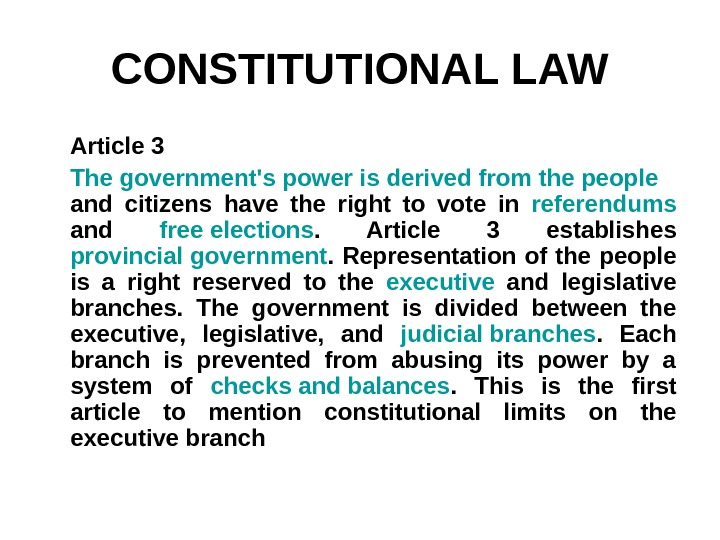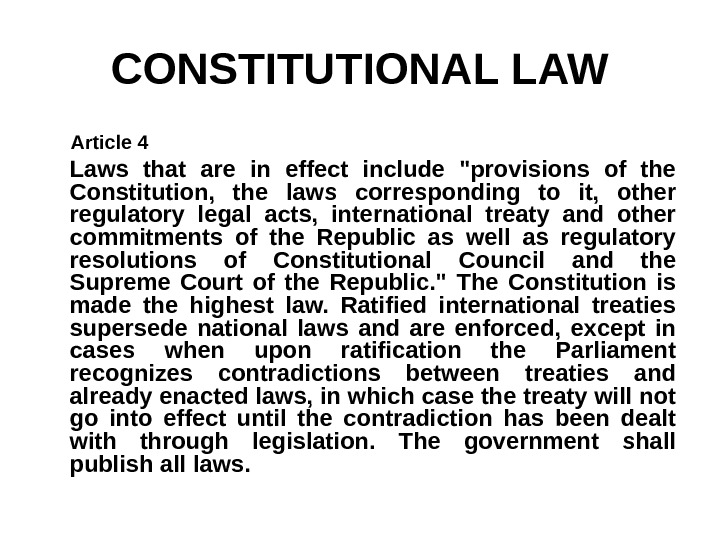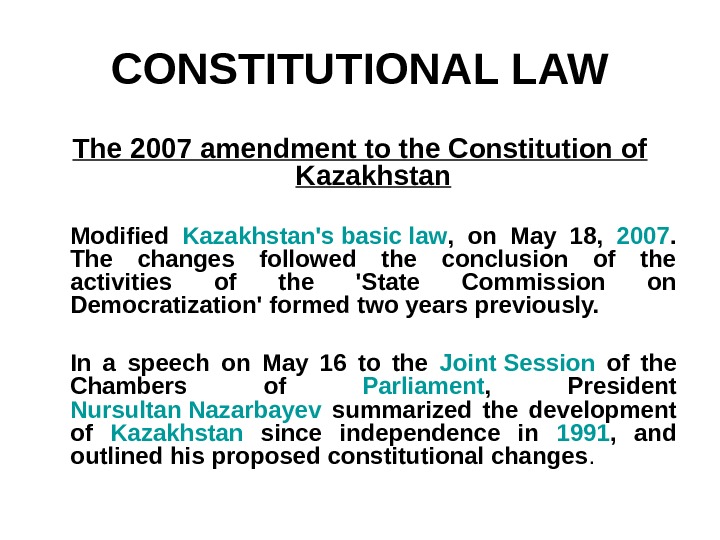CONSTITUTIONAL LAW The Constitution of Kazakhstan is the












constitutional_law_2.ppt
- Размер: 191 Кб
- Количество слайдов: 12
Описание презентации CONSTITUTIONAL LAW The Constitution of Kazakhstan is the по слайдам
 CONSTITUTIONAL LAW The Constitution of Kazakhstan is the highest law of Kazakhstan , as stated in Article 4. The Government of Kazakhstan approved the constitution on 30 August 1995. Preamble The preamble of the constitution emphasizes the importance of » freedom , equality and concord » and Kazakhstan’s role in the international community.
CONSTITUTIONAL LAW The Constitution of Kazakhstan is the highest law of Kazakhstan , as stated in Article 4. The Government of Kazakhstan approved the constitution on 30 August 1995. Preamble The preamble of the constitution emphasizes the importance of » freedom , equality and concord » and Kazakhstan’s role in the international community.
 CONSTITUTIONAL LAW Section 1, General Provisions Article 1 establishes the state as a secular democracy that values individual «life, rights and freedoms. » It outlines social and «political stability, economic development, » patriotism , and democracy as the principles upon which the Government serves. This is the first article in which the Parliament is mentioned. •
CONSTITUTIONAL LAW Section 1, General Provisions Article 1 establishes the state as a secular democracy that values individual «life, rights and freedoms. » It outlines social and «political stability, economic development, » patriotism , and democracy as the principles upon which the Government serves. This is the first article in which the Parliament is mentioned. •
 CONSTITUTIONAL LAW Article 2 states that Kazakhstan is a unitary state and the government is presidential. The government has jurisdiction over, and is responsible for, all territory in Kazakhstan. Regional, political divisions, including location of the capital, are left open to lower level legislation. «Republic of Kazakhstan» and «Kazakhstan» are considered one and the same.
CONSTITUTIONAL LAW Article 2 states that Kazakhstan is a unitary state and the government is presidential. The government has jurisdiction over, and is responsible for, all territory in Kazakhstan. Regional, political divisions, including location of the capital, are left open to lower level legislation. «Republic of Kazakhstan» and «Kazakhstan» are considered one and the same.
 CONSTITUTIONAL LAW Article 3 The government’s power is derived from the people and citizens have the right to vote in referendums and free elections. Article 3 establishes provincial government. Representation of the people is a right reserved to the executive and legislative branches. The government is divided between the executive, legislative, and judicial branches. Each branch is prevented from abusing its power by a system of checks and balances. This is the first article to mention constitutional limits on the executive branch
CONSTITUTIONAL LAW Article 3 The government’s power is derived from the people and citizens have the right to vote in referendums and free elections. Article 3 establishes provincial government. Representation of the people is a right reserved to the executive and legislative branches. The government is divided between the executive, legislative, and judicial branches. Each branch is prevented from abusing its power by a system of checks and balances. This is the first article to mention constitutional limits on the executive branch
 CONSTITUTIONAL LAW Article 4 Laws that are in effect include «provisions of the Constitution, the laws corresponding to it, other regulatory legal acts, international treaty and other commitments of the Republic as well as regulatory resolutions of Constitutional Council and the Supreme Court of the Republic. » The Constitution is made the highest law. Ratified international treaties supersede national laws and are enforced, except in cases when upon ratification the Parliament recognizes contradictions between treaties and already enacted laws, in which case the treaty will not go into effect until the contradiction has been dealt with through legislation. The government shall publish all laws.
CONSTITUTIONAL LAW Article 4 Laws that are in effect include «provisions of the Constitution, the laws corresponding to it, other regulatory legal acts, international treaty and other commitments of the Republic as well as regulatory resolutions of Constitutional Council and the Supreme Court of the Republic. » The Constitution is made the highest law. Ratified international treaties supersede national laws and are enforced, except in cases when upon ratification the Parliament recognizes contradictions between treaties and already enacted laws, in which case the treaty will not go into effect until the contradiction has been dealt with through legislation. The government shall publish all laws.
 CONSTITUTIONAL LAW The 2007 amendment to the Constitution of Kazakhstan M odified Kazakhstan’s basic law , on May 18, 2007. The changes followed the conclusion of the activities of the ‘State Commission on Democratization’ formed two years previously. In a speech on May 16 to the Joint Session of the Chambers of Parliament , President Nursultan Nazarbayev summarized the development of Kazakhstan since independence in 1991 , and outlined his proposed constitutional changes.
CONSTITUTIONAL LAW The 2007 amendment to the Constitution of Kazakhstan M odified Kazakhstan’s basic law , on May 18, 2007. The changes followed the conclusion of the activities of the ‘State Commission on Democratization’ formed two years previously. In a speech on May 16 to the Joint Session of the Chambers of Parliament , President Nursultan Nazarbayev summarized the development of Kazakhstan since independence in 1991 , and outlined his proposed constitutional changes.
 CONSTITUTIONAL LAW The main changes proposed by the President were as follows: The reduction of the presidential term from 7 -years to 5 -years, coming into effect after the next election in 2012 To adopt proportional representation for the Majilis , or lower Chamber of deputies
CONSTITUTIONAL LAW The main changes proposed by the President were as follows: The reduction of the presidential term from 7 -years to 5 -years, coming into effect after the next election in 2012 To adopt proportional representation for the Majilis , or lower Chamber of deputies
 CONSTITUTIONAL LAW To increase the number of senators selected by the President , from 7 to 15 To give to the Senate the power of consultation on the appointment of a President of the National Bank To increase the number of Majilis deputies to 107 — 98 deputies elected by proportional representation and 9 deputies representing the Assembly of the Peoples’ of Kazakhstan. The total number of the parliamentary deputies will therefore increase by 38 and will amount to
CONSTITUTIONAL LAW To increase the number of senators selected by the President , from 7 to 15 To give to the Senate the power of consultation on the appointment of a President of the National Bank To increase the number of Majilis deputies to 107 — 98 deputies elected by proportional representation and 9 deputies representing the Assembly of the Peoples’ of Kazakhstan. The total number of the parliamentary deputies will therefore increase by 38 and will amount to
 CONSTITUTIONAL LAW To strengthen the powers of political parties by depriving members of the Majilis of their mandate in the event that they are expelled from their party To make the government accountable not only to the Head of State, but to the whole Parliament; by giving the Government a vote of no-confidence. It will be sufficient for the Majilis to have a simple majority of deputies’ votes compared with the previously required two thirds of votes, in order to dismiss the government To change, the procedure forming the and the Central Election Commission. This will occur via the introduction of a law whereby two thirds of the Constitutional Council, the Central Election Commission and Auditing Committee will be formed by Parliament
CONSTITUTIONAL LAW To strengthen the powers of political parties by depriving members of the Majilis of their mandate in the event that they are expelled from their party To make the government accountable not only to the Head of State, but to the whole Parliament; by giving the Government a vote of no-confidence. It will be sufficient for the Majilis to have a simple majority of deputies’ votes compared with the previously required two thirds of votes, in order to dismiss the government To change, the procedure forming the and the Central Election Commission. This will occur via the introduction of a law whereby two thirds of the Constitutional Council, the Central Election Commission and Auditing Committee will be formed by Parliament
 CONSTITUTIONAL LAW To change the procedure of forming the Government, where the Prime Minister is appointed by the President, so that the approval of such appointments, and consequently that of the entire Government, is delegated to the Majilis To introduce a change whereby the composition of the Government shall be formed according to the proposals of the Prime Minister. The Prime Minister will also represent the parliamentary majority party
CONSTITUTIONAL LAW To change the procedure of forming the Government, where the Prime Minister is appointed by the President, so that the approval of such appointments, and consequently that of the entire Government, is delegated to the Majilis To introduce a change whereby the composition of the Government shall be formed according to the proposals of the Prime Minister. The Prime Minister will also represent the parliamentary majority party
 CONSTITUTIONAL LAW To abolish the constitutional prohibition of state funding of NGO ‘s To develop a procedure for the partial funding of political parties from the state budget To abolish the death penalty in Kazakhstan In addition to these proposals the Kazakh parliament passed an additional amendment two days later, lifting the term-limit clause on the first President of Kazakhstan , Nursultan Nazarbayev, in a move some say paved the way for him to become de facto President for life.
CONSTITUTIONAL LAW To abolish the constitutional prohibition of state funding of NGO ‘s To develop a procedure for the partial funding of political parties from the state budget To abolish the death penalty in Kazakhstan In addition to these proposals the Kazakh parliament passed an additional amendment two days later, lifting the term-limit clause on the first President of Kazakhstan , Nursultan Nazarbayev, in a move some say paved the way for him to become de facto President for life.
 CONSTITUTIONAL LAW To abolish the death penalty in Kazakhstan In addition to these proposals the Kazakh parliament passed an additional amendment two days later, lifting the term-limit clause on the first President of Kazakhstan, Nursultan Nazarbayev, in a move some say paved the way for him to become de facto President for life.
CONSTITUTIONAL LAW To abolish the death penalty in Kazakhstan In addition to these proposals the Kazakh parliament passed an additional amendment two days later, lifting the term-limit clause on the first President of Kazakhstan, Nursultan Nazarbayev, in a move some say paved the way for him to become de facto President for life.
